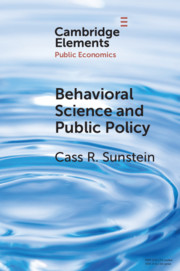8 results
Do we have too much choice?
-
- Journal:
- Economics & Philosophy , First View
- Published online by Cambridge University Press:
- 27 January 2025, pp. 1-28
-
- Article
-
- You have access
- Open access
- HTML
- Export citation
Nudges, Regulations and Liberty
-
- Journal:
- British Journal of Political Science / Volume 53 / Issue 1 / January 2023
- Published online by Cambridge University Press:
- 31 January 2022, pp. 204-220
-
- Article
-
- You have access
- Open access
- HTML
- Export citation
14 - On Capability and its Measurement
- from Part II - Methods, Measurement and Empirical Evidence
-
-
- Book:
- The Cambridge Handbook of the Capability Approach
- Published online:
- 11 November 2020
- Print publication:
- 19 November 2020, pp 271-292
-
- Chapter
- Export citation
The Shifting Politics of Public Services: Discourses, Arguments, and Institutional Change in Sweden, c. 1620–2000
-
- Journal:
- Journal of Policy History / Volume 32 / Issue 4 / October 2020
- Published online by Cambridge University Press:
- 28 October 2020, pp. 463-486
-
- Article
- Export citation

Behavioral Science and Public Policy
-
- Published online:
- 26 October 2020
- Print publication:
- 12 November 2020
-
- Element
- Export citation
WANG CHONG'S FATALISM
-
- Journal:
- Early China / Volume 43 / September 2020
- Published online by Cambridge University Press:
- 05 November 2020, pp. 285-310
- Print publication:
- September 2020
-
- Article
- Export citation
Exit, voice and indifference – older people as consumers of Swedish home care services
-
- Journal:
- Ageing & Society / Volume 36 / Issue 10 / November 2016
- Published online by Cambridge University Press:
- 24 August 2015, pp. 2163-2181
- Print publication:
- November 2016
-
- Article
- Export citation
6 - Two conceptions of compatibilism in the Critical Elucidation
-
-
- Book:
- Kant's 'Critique of Practical Reason'
- Published online:
- 06 August 2010
- Print publication:
- 08 April 2010, pp 119-144
-
- Chapter
- Export citation

